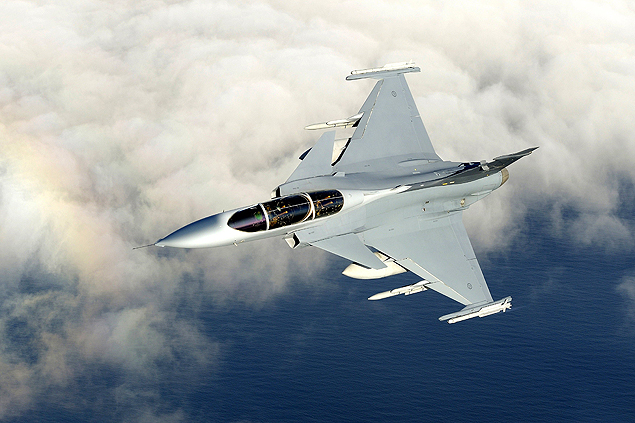Latest Photo Galleries
Brazilian Markets
12h14 Bovespa |
+0,38% | 124.647 |
16h43 Gold |
0,00% | 117 |
12h33 Dollar |
+0,36% | 5,2613 |
16h30 Euro |
+0,49% | 2,65250 |
ADVERTISING
Analysis: Brazil Opted for Cheapest Proposal in Aircraft Deal
12/19/2013 - 04h35
Advertising
IGOR GIELOW
DIRECTOR OF THE BRASILIA OFFICE
The decision of the Brazilian Air Force (FAB) to buy fighter jets and military equipment from the Swedish company Saab Gripen NG is down to a combination of factors.
However, the deal in fact represents something rare in this type of business: the company offering the best price won the contract.
Gripen's offer was worth around US$ 6 billion in the initial phase of bidding, back in 2008, while the French competitor Dassault Rafale offered approximately US$ 8 billion.
The American company F/A-18 was the only one to offer a fixed price, since it is obliged to inform Congress. Their offer was US$ 7.5 billion.
The Swedish plane is also cheaper to operate, as it runs on only one motor, though in general pilots prefer the extra security offered by bi-motor planes, knowing that if one motor breaks down, another will remain in operation.
Specialists estimate that the price per hour of flight is US$ 4,000 when flying in formation. The figure for the F-18 model is between US$ 10,000 and US$ 14,000, and for the Rafale, US$ 14,000.
These are Saab's own figures, but they were not contested by the competition.
There is also the question of technology transfer. No plane is 100% transferrable, though the French talked up the transferability of their model.
The Americans were restricted in this aspect, their tradition of embargoes preventing the future manufacture of the technology outside the U.S.
However, Gripen uses many American parts, starting with the motor, which is identical to the F/A-18. It was even rumored that the Americans did not mind the victory of the Swedish company, as long as the French lost out.
However, the greatest advantage offered by Saab is that since the New Generation jet is a work in progress based on previous Gripen models, Brazil will be able to actively participate in the process of integration of aviation systems.
In other words, Brazil will 'learn' how to make an advanced supersonic jet with state-of-the-art avionics.
Both Dassault and Boeing offered other advantages, including the transfer of sensitive technologies (such as supersonic wind tunnels and composite materials), but their planes are ready, fixed.
With Saab the expectation is that the first planes will be imported, but that they will increasingly come to be made in Brazil, as part of a nationalized enterprise. Saab already has one plant running at São Bernardo do Campo.
During President Rousseff's government, in the last two years, the proposals have been revised, but the exact numbers remain a secret. Dassault lowered its commercial proposal by USD $2 billion, but the figures will only become known once the contract has been signed and sealed.
In recent presentations, Saab has affirmed that it will be possible to establish a construction program in seven years, with the first five planes being constructed in the first year. It has also promised that the government's outlay will begin only in the eighth year.
Moreover, this is not merely the purchase of 36 planes (28 made for a single pilot; 8 with space for a co-pilot). Long-distance missiles, bombs and towable targets for training are all part of a larger package of logistics and training materials.
In the purchase of this new version of Gripen, Brazil now joins Sweden and Switzerland. The previous model is used by Sweden, South Africa, the Czech Republic, Hungary, Thailand and the United Kingdom (in the latter case, for training purposes only).
Translated by TOM GATEHOUSE
Read the article in the original language
| AFP | ||
 |
||
| Gripen's offer was worth around US$ 6 billion, while the French competitor Dassault Rafale offered US$ 8 billion |



